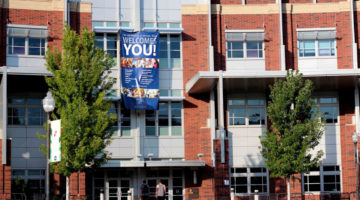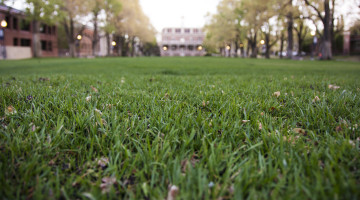
Whitney Weinheimer cycles across the gazebo in the rose garden on Monday, Sept. 5. More students have been taking advantage of the bike-friendly campus.
Many students at the University of Nevada, Reno, have chosen to ditch the parking lines and gas pumps to take their usual school routes by bicycle. Across campus, bicyclists are finding many open spaces on bike racks, more places to fill up flat tires and even a bike repair stand in front of the Joe Crowley Student Union.
UNR and the Campus Bicycle Committee have been dedicated to making campus a more bike-friendly place by encouraging students to pursue a healthier and cheaper commute.
“I believe UNR has made campus a more bike-friendly place,” said Krystine Kimes, former president of the Campus Cycling Coalition and avid bicyclist. “As a past member and president of the UNR Campus Cycling Coalition, it has been made evident to me that bicycle awareness at UNR exists. For example, the Campus Bicycle Committee led by Amy Fitch exists, and they have done a lot to promote bicycling on campus, such as installing a bicycle repair stand on campus, submitting a Bicycle Friendly University application and creating/updating a campus bicycle map to name a few.”
Last year, the League of American Bicyclists recognized UNR as a bicycle-friendly university and awarded the school a bronze-level distinction. UNR joined 127 other colleges and universities across the U.S. to receive a bronze-level distinction in 2015.
The growth of cycling culture on campus has spread to the community around it; for example, The Dropout Bike Shop, located just across UNR on Virginia Street, opened last spring to bring student riders affordable bike repair services.
“The Dropout is really convenient for freshmen who live in the dorms since we are so close to campus, and with more kids living on campus it helps a lot with selling bikes,” said Chad Kortan, owner and founder of The Dropout.
Kortan had been working on bikes in Reno for 12 years before opening up The Dropout last spring.
“I see the community slowly becoming more bike friendly, but some business owners think that without car parking and easy car access to their businesses that they will have less business, even though studies actually show that having improved bike and walking access actually helps business,” Kortan said.
With a record-breaking enrollment total, returning students are having to find housing off campus so the university can accommodate incoming freshmen. Many off-campus students have turned to biking as a reliable source of transportation to school.
“If the numbers have grown, I can speculate that it is because more and more people are realizing that bicycling is cheaper and an effective mode of transportation. Or maybe they are starting to see it is cool and stylish,” Kimes said.
The Campus Bicycle Committee has partnered with the Reno Bike Project, a local nonprofit bike shop that has been committed to creating a more bike-friendly community for 10 years. This partnership has brought about free workshops and bike repair clinics.
“The committee has worked on a variety of projects over the past few years,” said Amy Fitch, chair of the Campus Bicycle Committee. “During the first few weeks of fall semester we are offering three safety/maintenance workshops, two sessions of free basic bike repair on campus and a campus bicycle tour. We have a campus bicycle map/guide and a website, both of which contain safety tips, information on state laws and campus policies, and resources for bicyclists on campus.”
University Parking Services has also created incentives for students to ride their bikes to and around campus. They have provided free bicycle permits and bike lockers for rent. Bike permit registration helps the Campus Bicycle Committee gather information about the number of bicyclists riding on campus. Parking Services also gives registered bike owners five free day-use parking permits when the weather or other situations do not allow bicyclists to ride to school.
Fitch said the committee is working with UNR Facilities Services to update design and construction standards, such as improving bike racks to mirror the recommended design by the Association of Pedestrian and Bicycle Professionals.
“There are a few projects planned on the streets around campus that would help improve access and safety,” Fitch said. “We are eager to see those projects be implemented and will continue to communicate with Washoe County Regional Transportation Commission planners and engineers in the coming years.”
Kortan said he would like to see RTC make improvements on the Virginia Street overpass that crosses Interstate 80. The bridge is filled with potholes, and there is no bike lane to protect riders from traffic.
“There is also no bike lane on Virginia Street from campus to Midtown. I think Virginia Street needs a lot of work to be more bike-friendly,” Kortan said.
RTC is working toward creating more bike lanes and bike paths throughout the downtown and Midtown districts. It is also conducting a study on a bike-share program where riders can rent public bikes; these bikes would be available 24/7 year-round. Bike-share programs have been implemented in over 600 cities to give the public a cheaper and more sustainable mode of transportation.
The RTC is in the early stages of the bike-share project that began in June of 2014. The project committee is determining if the demand for a bike-share program is enough to continue with the project.
Fitch says the Campus Bicycle Committee will continue to advocate for more bike-friendly resources for UNR and the community around it.
“It is certainly our goal to increase the number of students, faculty and staff who bike to campus,” Fitch said. “The university is growing; increasing bicycle commuting is in line with UNR’s sustainability goals, and the university’s master plan advocates for increased resources and facilities to encourage and accommodate bicycles. Our committee has accomplished a lot, but there is certainly more work to do!”
RTC is also looking into creating a smartphone app to identify where bike racks are located throughout Reno. The app would also allow users to notify RTC about where more bike racks are necessary and where old racks need to be replaced. With community commitment, both RTC and UNR hope to see Reno transform into a safer and more welcoming place for bicyclists.
Rachel Spacek can be reached at jsolis@sagebrush.unr.edu and on Twitter @TheSagebrush.











